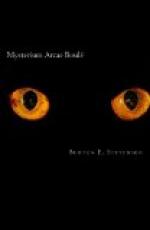“Yes,” Godfrey agreed, and blew a meditative ring toward the ceiling.
And presently he went away without saying anything more.
But the more I thought of it, the more the inflection he had given that word seemed an interrogation rather than an affirmation.
And when I opened my paper next morning, I more than half expected to be greeted with a black headline announcing the looting of the strong-room of La Bretagne. But there was no such headline, and with a sigh, half of relief and half of disappointment, I turned to the other news.
But two weeks later, a black headline did catch my eye:
MICHAELOVITCH JEWELS FALSE!
FRENCH DETECTIVE TAKES BACK PASTE IMITATIONS FROM AMERICA.
Fraud Discovered When
the Grand Duke Michael Sends them to a
Jeweller to be Reset.
I had no need to read the article which followed, for I saw in a flash what had occurred. I saw, too, why Crochard had retained the paste jewels—he had a use for them! How or where the substitution had been made, I could only guess; but one thing was certain: the two weeks which had elapsed before the theft was discovered had given him ample opportunity to dispose of his plunder. I felt sorry for the Grand Duke; sorrier still for that admirable M. Pigot; but, after all, one could not but admire the cleverness of the man who had despoiled them.
Who, I wondered, had bought the Mazarin? Surely there was a diamond most difficult to sell.
It could, of course, be cut up—– but that would be sacrilege!
That question was answered, before long, in an unexpected way—a way which filled many columns in the papers, which delighted the comedy-loving French, and which gave Crochard a unique advertisement. One morning, in the personal column of Le Matin, appeared a notice, of which this is the English:
“To M. the Director of the Museum of the Louvre:
“It has been my good fortune to come into possession of the rose-diamond known as the Mazarin. It is my wish to restore it to your collection, in order that it may no longer be necessary to delude the public with an imitation of coloured glass. It will give me great pleasure to present this brilliant to you, with my compliments, provided His Highness, the Grand Duke Michael, who preceded me in possession of the diamond, will join me in the gift. Should he refuse, it will be my melancholy duty to cleave the diamond into a number of smaller stones, as it is too large for my use. But I hope that he will not refuse.
“CROCHARD, L’Invincible!”
What could the Grand Duke do? To have refused, would have made him the butt of the boulevards. Besides, he was, after all, losing nothing which he had not already lost. So, with a better grace than one might have expected, he consented to join in the restoration. Two days later, the director of the Louvre discovered a packet upon his desk. He opened it and found within the Mazarin. When you visit the Louvre, you will see it in the place of honour in the glass case in the centre of the Gallery of Apollo, with an attendant on guard beside it. But already the circumstances of its restoration are fading from the public memory.




